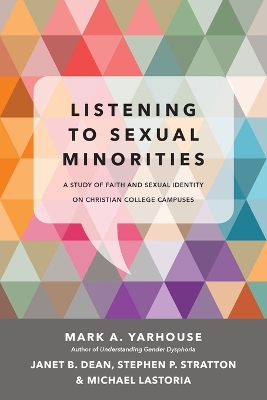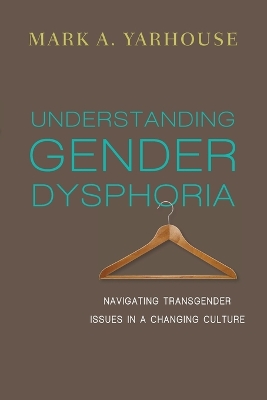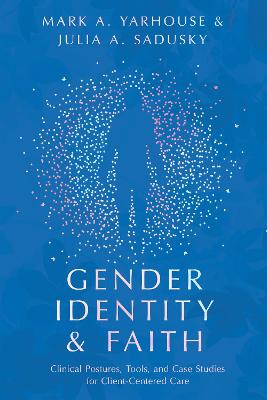Christian Association for Psychological Studies Books
5 total works
Listening to Sexual Minorities
by Mark A. Yarhouse, Janet B. Dean, Stephen P. Stratton, and Michael Lastoria
Published 24 April 2018
Students arrive on campus with various boxes of belongings to unpack, some heavy, some tidy, some more valuable, some more private. For many students, two of these boxes could be labeled "My Faith" and "My Sexuality"-and these two can be among the most cumbersome to handle. How to balance the two without having to set one down? How to hold them both closely, both securely, but still move forward to settle in with new friends in a new environment? How to keep from dropping one or the other, spilling its embarrassing contents for all to see?
Such can be the struggle for any student, but especially for any sexual minority who identifies or struggles with an LGB+ identity or same-sex attraction on a Christian college campus. For these students their faith and their sexuality often feel both tender and in acute tension. Who is God making them to be? What do they need to grow in to develop faithfully, and what might they need to leave behind? How can they truly flourish?
The research team of Yarhouse, Dean, Stratton, and Lastoria draw on their decades of experience both in the psychology of sexual identity and in campus counseling to bring us the results of an original longitudinal study into what sexual minorities themselves experience, hope for, and benefit from. Rich with both quantitative and qualitative data, their book gives an unprecedented opportunity to listen to sexual minorities in their own words, as well as to observe patterns and often surprising revelations about life and personal development both on campus and after graduation.
Listening to Sexual Minorities will be an indispensable resource not only for counselors and psychologists but also for faculty, student-development leaders, and administrators in higher education as well as leaders in the church and wider Christian community who want to create an intentional environment to hear from and contribute to the spiritual flourishing of all.
Christian Association for Psychological Studies (CAPS) Books explore how Christianity relates to mental health and behavioral sciences including psychology, counseling, social work, and marriage and family therapy in order to equip Christian clinicians to support the well-being of their clients.
Such can be the struggle for any student, but especially for any sexual minority who identifies or struggles with an LGB+ identity or same-sex attraction on a Christian college campus. For these students their faith and their sexuality often feel both tender and in acute tension. Who is God making them to be? What do they need to grow in to develop faithfully, and what might they need to leave behind? How can they truly flourish?
The research team of Yarhouse, Dean, Stratton, and Lastoria draw on their decades of experience both in the psychology of sexual identity and in campus counseling to bring us the results of an original longitudinal study into what sexual minorities themselves experience, hope for, and benefit from. Rich with both quantitative and qualitative data, their book gives an unprecedented opportunity to listen to sexual minorities in their own words, as well as to observe patterns and often surprising revelations about life and personal development both on campus and after graduation.
Listening to Sexual Minorities will be an indispensable resource not only for counselors and psychologists but also for faculty, student-development leaders, and administrators in higher education as well as leaders in the church and wider Christian community who want to create an intentional environment to hear from and contribute to the spiritual flourishing of all.
Christian Association for Psychological Studies (CAPS) Books explore how Christianity relates to mental health and behavioral sciences including psychology, counseling, social work, and marriage and family therapy in order to equip Christian clinicians to support the well-being of their clients.
Foreword Reviews' INDIEFAB Honorable Mention
Few topics are more contested today than gender identity.
In the fog of the culture war, complex issues like gender dysphoria are reduced to slogans and sound bites. And while the war rages over language, institutions and political allegiances, transgender individuals are the ones who end up being the casualties.
Mark Yarhouse, an expert in sexual identity and therapy, challenges the church to rise above the political hostilities and listen to people's stories. In Understanding Gender Dysphoria, Yarhouse offers a Christian perspective on transgender issues that eschews simplistic answers and appreciates the psychological and theological complexity. The result is a book that engages the latest research while remaining pastorally sensitive to the experiences of each person.
In the midst of a tense political climate, Yarhouse calls Christians to come alongside those on the margins and stand with them as they resolve their questions and concerns about gender identity. Understanding Gender Dysphoria is the book we need to navigate these stormy cultural waters.
Christian Association for Psychological Studies (CAPS) Books explore how Christianity relates to mental health and behavioral sciences including psychology, counseling, social work, and marriage and family therapy in order to equip Christian clinicians to support the well-being of their clients.
The Integration of Psychology and Christianity
by William L. Hathaway and Mark A. Yarhouse
Published 17 August 2021
Over the course of recent decades, scholars and practitioners have been working to integrate contemporary psychology-related fields and Christianity. This project continues to move forward, evidenced in associations, publications, degree programs, and conferences around the world. While much progress has been made, there are still foundational issues to be worked out and aspects of integration the community is just now venturing into.
In this expert overview, psychologists William L. Hathaway and Mark A. Yarhouse take stock of the integration project to date, provide an introduction for those who wish to come on board, highlight work yet to be done, and offer a framework to strategically organize next steps. The authors' attention encompasses five domains:
Their comprehensive approach yields insights relevant for non-clinical areas of psychological science as well as for counseling, social work, and other related mental health fields.
Done properly, integration enriches our understanding of both Christianity and psychology. Through biblical and theological grounding and numerous examples, Hathaway and Yarhouse demonstrate how synthesis can continue to serve the field and make a difference in caring for individual lives.
In this expert overview, psychologists William L. Hathaway and Mark A. Yarhouse take stock of the integration project to date, provide an introduction for those who wish to come on board, highlight work yet to be done, and offer a framework to strategically organize next steps. The authors' attention encompasses five domains:
- worldview integration
- theoretical integration
- applied integration
- role integration
- personal integration
Their comprehensive approach yields insights relevant for non-clinical areas of psychological science as well as for counseling, social work, and other related mental health fields.
Done properly, integration enriches our understanding of both Christianity and psychology. Through biblical and theological grounding and numerous examples, Hathaway and Yarhouse demonstrate how synthesis can continue to serve the field and make a difference in caring for individual lives.
Helping people navigate gender identity questions today is complex and often polarized work. For clients and families who are also informed by their faith, some mental health approaches raise more questions than answers. Clinicians need a client-centered, open-ended approach that makes room for gender exploration while respecting religious identity.
Gender Identity and Faith carves out clinical space for mental health professionals to help people who wish to take seriously their gender identity, their religious identity, and the relationship between the two. Drawing from their extensive research and experience with clients, Mark Yarhouse and Julia Sadusky provide a timely, practical resource for practitioners. This book
"Integrating personhood and values is no easy feat, especially in our current cultural landscape," the authors write. Those navigating this intersection need clinicians who seek to understand their unique context and journey alongside them with empathy. This book points the way.
Gender Identity and Faith carves out clinical space for mental health professionals to help people who wish to take seriously their gender identity, their religious identity, and the relationship between the two. Drawing from their extensive research and experience with clients, Mark Yarhouse and Julia Sadusky provide a timely, practical resource for practitioners. This book
- emphasizes respect for clients' journeys, without a single fixed outcome, toward congruence between their gender identity and faith
- describes effective clinical postures, assessment and therapeutic tools, and numerous case studies
- covers needs and characteristics of children, youth, and adult clients
- includes worksheets and prompts for clients and family members
"Integrating personhood and values is no easy feat, especially in our current cultural landscape," the authors write. Those navigating this intersection need clinicians who seek to understand their unique context and journey alongside them with empathy. This book points the way.




